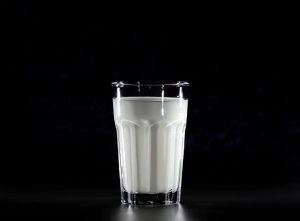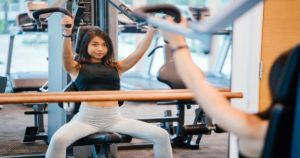
Dairy – A Healthy Choice That Idiots Don’t Realize
Dairy – A Healthy Choice That Idiots Don’t Realize Dairy is extremely misunderstood and often picked on by the vegan and paleo communities. Many people

If you’re like most people, you want to grow thicker slabs of hard muscle that attracts the opposite sex while simultaneously torching away squishy bodyfat like a fiery furnace.
This is called body recomposition or recomping for short. It’s a pretty controversial topic in the fitness industry. Some people think recomping is not possible cause it’s just too good to be true. Can you really build muscle and lose fat at the same time?
Let’s find out.
Some people think recomping is a fairytale. According to these haters, you need to be in a caloric deficit to lose fat and be in a caloric surplus to build muscle.
The first statement is usually true, but the second actually isn’t. You technically don’t need to be in a caloric surplus to build muscle. Muscle is built when muscle protein synthesis exceeds muscle protein breakdown which is just a fancy way of saying you need to construct more muscle than your body breaks down.
This can be done without eating in a caloric surplus. For muscle to grow, you simply need a muscle building signal, adequate protein intake, and energy from glycogen/triglycerides to sufficiently fuel the muscle building process (1).
You can get a muscle building signal by strength training progressively. You can get adequate protein intake by eating animal carcasses or swallowing a ton of beans if you’re into that whole vegan movement. And lastly, you can get plenty of glycogen/triglycerides from stored tissue in your body.
So as long as your body constructs more muscle proteins than you breakdown, you’ll have a net amount of muscle growth even as fat loss is occurring.
Furthermore, fat and muscle are completely separate tissues. Caloric balance can affect the size of stored tissue separately. Energy can be building up in one tissue while being broken down in another tissue over time almost like 2 separate bank accounts.
So anyone who tells you recomping is impossible doesn’t understand basic physics and should probably go back to a High School science class.
Recomping is most definitely possible, but is it practical? Can you see substantial results as opposed to merely losing fat or building muscle one phase at a time?
From a majority of the scientific studies and personal anecdote, it seems there are 4 categories of people where recomping can be viable.
When you’re newer to lifting, you have a lot of muscle building potential. You haven’t experienced years of muscular tension where hypertrophy becomes more difficult and less pronounced.
Because of the giant ceiling of potential growth in new lifters, it’s pretty common to see beginners recomp when everything’s done properly (2,3,4,5).
Recomping is also viable in anyone that carries excessive bodyfat (6,7). The more you have, the more practical recomping becomes because you’ll have plenty of additional stored energy that can fuel the muscle building process (8).
This is less likely to happen in lean individuals as lean people have less available body fat and are more likely to breakdown protein for fuel which totally goes against the goal of recomping (8).
Let’s say, you get jumped by a gang of kettlebell wielding midgets. You get severely injured and stop lifting for a few months until your injuries heal. When you start lifting again, assuming everything else is optimal, you’re now in a position to recomp thanks to those violent midgets.
The muscle you lost while laying in a hospital bed is easily rebuilt thanks to muscle memory (9). Some muscle size might’ve been lost, but the myonuclei which is the muscle control headquarters still remains and aid in rebuilding lost muscle quickly even if fat loss is simultaneously occurring.
This is still recomping, but to be fair, you’ll be losing fat and building the muscle you previously lost, not necessarily building new size that hasn’t been acquired yet. However, this is still good to know in case you’re forced to stop lifting extensively for whatever wild reason.
Steroid users can also recomp. Various black-market substances can easily suppress muscle protein breakdown while ramping up muscle protein synthesis beyond natural levels. This is why enhanced lifters can create such epic physiques in a shorter time frame.
So what if I’m not a gym noob, overweight, detrained, or on steroids? Is recomping practical?
Maybe? Studies that show recomping effects in advanced people are typically only found in elite athletes playing traditional sports (10). This doesn’t apply well to the average advanced lifter who’s had years of strength training experience because elite athletes typically have amazing genetics as well as being novices to strength training.
Yes, you read that right. I just called elite athletes noobs to strength training. Here’s why.
Many elite athletes, although deeply advanced in their sport don’t experience high levels of mechanical tension especially in body parts that are less vital for their sport. So while they are exceptionally trained in their sports, much of their muscle tissue when compared to advanced lifters, should be considered intermediate at best. This is what explains their ability to recomp in the studies.
Furthermore, there are also other flaws in thinking elite lifters can recomp because we see elite athletes in traditional sports recomp.
For example, elite gymnasts have been shown to recomp, but their training program involves training for nearly 5 hours a day which is massively unrealistic (11).
Football and Rugby players have also been shown to recomp slightly, but in both sports, steroid use is highly relevant along with players typically carry extra body fat, both factors making body recomposition more doable (12,13,14).
In non-traditional sports athletes, advanced lifters rarely see significant recomp changes and even then, the studies have many limitations like design flaws and unrealistic protein intake (15,16).
There also seems to be a trend that women are more likely to recomp because they typically have higher absolute body fat percentages (17).
As an advanced lifter, you have to do many things right and if you’re too lean, there’s little fat draw from to fuel the recomping process (22). All this to say, it’s not a guarantee and your only chances are with more body fat.
I like to describe recomping as a possible symptom as opposed to a goal. You don’t chase recomping. If you’re on a cut, you optimize as many variables as you can and recomping can potentially happen even in advanced lifters (22). However, during a bulk, recomping is likely not possible as a surplus of energy generally prevents net fat loss from occuring.

So if you’re a veteran in the gym, already built a good amount of muscle, and don’t have much fat, recomping is not practical to further improve your physique.
For more robust body composition changes, it’s time to bulk and enter specific bulking/cutting phases.
In fact, purely bulking will build much more muscle than trying to build muscle in a deficit (18,19,20).
If you fit one of the 4 categories above where recomping is practical or you want to try it anyways, here’s how to do it:
Alright boys and girls, here’s what we learned today about trying to combine fat loss with muscle hypertrophy in the same phase:
Grab my free Stupid Simple Scroll to Mastering Hypertrophy

Dairy – A Healthy Choice That Idiots Don’t Realize Dairy is extremely misunderstood and often picked on by the vegan and paleo communities. Many people

Does Weight Training Stunt a Child’s Growth? We’ve all heard the mantra that weight training is bad for kids. According to soccer moms across America,

The fitness industry used to tell you building more muscle will boost your metabolism therefore allowing you to eat more food without fat gain. Fast forward a decade later to present day and coaches are now saying the opposite.